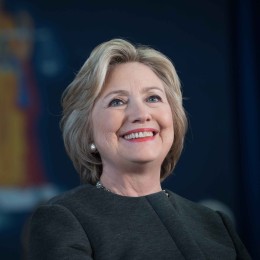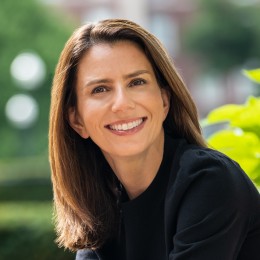Inside the Situation Room
Co-taught by Secretary Hillary Rodham Clinton and Dean Keren Yarhi-Milo, this course engages learners with case studies and examines decision-making in historical and contemporary contexts, from the search for Osama bin Laden, to the “red line” in Syria, to negotiating with Iran.
Modules/Weeks
Weekly Effort
Discipline
Format
Cost
Course Description
In an era increasingly defined by geopolitical competition, it is more important than ever for future policymakers to understand why and how foreign policy decisions are made. Inside the Situation Room, co-taught by Secretary Hillary Rodham Clinton and Dean Keren Yarhi-Milo, employs insights from diverse academic fields—including political psychology, domestic politics, and international relations—and the direct experience of high-level principals in the room to understand the key factors which underpin a nation’s most crucial decisions. This course allows learners to engage with a range of case studies and examine decision-making in a variety of historical and contemporary contexts, from the search for Osama bin Laden, to the “red line” in Syria, to negotiating with Iran.
Online course launching Summer 2024.
What You Will Learn
The goal of this course is to give learners a holistic understanding of the many facets of foreign policy decision-making. As future participants in the policy process, this course will provide vital background that they can draw on should they, too, find themselves facing high-pressure decisions with implications for national security and global stability. It will also enhance their ability to counsel intelligence officers, military leaders, advisors, or other government officials by improving their ability to anticipate other actors' actions, perceptions, and motivations.
Instructors

Hillary Rodham Clinton has spent five decades in public service as an advocate, attorney, First Lady, U.S. Senator, U.S. Secretary of State, and presidential candidate.
Hillary Clinton was born in Chicago, Illinois on October 26, 1947. After graduating from Wellesley College and Yale Law School, she began her life-long work on behalf of children and families by joining the Children’s Defense Fund. In 1974, she moved to Arkansas, where she married Bill Clinton and became a successful attorney while also raising their daughter, Chelsea. During her 12 years as First Lady of Arkansas, she was Chairwoman of the Arkansas Education Standards Committee, co-founded the Arkansas Advocates for Children and Families, and served on the boards of the Arkansas Children's Hospital, and the Children's Defense Fund.
As First Lady of the United States, from 1993 to 2001, Hillary Clinton championed health care for all Americans and led successful bipartisan efforts to improve the adoption and foster care systems, reduce teen pregnancy, and create the Children's Health Insurance Program. She traveled to more than 80 countries standing up for human rights, democracy, and civil society. Her speech in Beijing in 1995 – where she declared that "human rights are women's rights, and women's rights are human rights" – inspired women worldwide and helped galvanize a global movement for women’s rights and opportunities.
In 2000, Clinton made history as the first First Lady elected to the United States Senate, and the first woman elected to statewide office in New York. As Senator, she worked across party lines to expand economic opportunity and access to quality, affordable health care. After the terrorist attacks of September 11, 2001, she secured funding to rebuild New York and provide health care for first responders who risked their lives working at Ground Zero. She also championed the cause of our nation's military and fought for better health care and benefits for wounded service members, veterans, and members of the National Guard and Reserves. In 2006, Clinton was reelected to the Senate, winning 58 out of New York’s 62 counties.
In 2007, she began her first historic campaign for president, winning 18 million votes and becoming the first woman to ever win a presidential primary or caucus state. In the 2008 general election, she campaigned for Barack Obama and Joe Biden, and in December, she was nominated by President-elect Obama to be Secretary of State.
In her four years as America's chief diplomat and the President's principal foreign policy adviser, Clinton played a central role in restoring America’s standing in the world and strengthening its global leadership, visiting 112 countries over 4 years, restoring America’s standing in the world. Her "smart power" approach to foreign policy elevated American diplomacy and development and repositioned them for the 21st century – with new tools, technologies, and partners, including the private sector and civil society around the world. She led the effort to impose crippling sanctions on Iran, laying the foundation for a historic agreement to curb its nuclear program, and negotiated a ceasefire between Israel and Hamas that prevented a new war in the Middle East. Across the world, she defended universal values and pushed the frontiers of human rights.
In 2016, Clinton made history again by becoming the first woman nominated for president by a major U.S. political party. As the Democratic candidate for president, she campaigned on a vision of America that is “stronger together” and an agenda to make our economy work for everyone, not just those at the top. She won the national popular vote, earning the support of nearly 66 million Americans.
Hillary Rodham Clinton is the author of ten best-selling books, including her groundbreaking book on children, It Takes A Village (1996); Dear Socks, Dear Buddy (1998); An Invitation to the White House (2000); her memoirs, Living History (2003), Hard Choices (2014), and What Happened (2017); a picture book edition of It Takes a Village (2017); The Book of Gutsy Women (2019) and Grandma’s Gardens (2020), in collaboration with Chelsea Clinton; and her political thriller, State of Terror (2021), with Louise Penny. She is also the host of You and Me Both, a podcast featuring candid, in-depth, and sometimes hilarious conversations with people she finds fascinating, and founder of HiddenLight Productions, a global studio creating premium documentary, unscripted, and scripted entertainment for TV, film, and digital.
In 2020, Clinton was appointed as the 11th and first female Chancellor of Queen’s University Belfast. In 2023, Clinton joined Columbia University as a Professor of Practice at the School of International and Public Affairs (SIPA) and Presidential Fellow at Columbia World Projects (CWP). She will be teaching a course with Dean Keren Yarhi-Milo this fall, called Inside the Situation Room, which will employ insights from diverse academic fields and the direct experience of high level principals in the room to understand the key factors which underpin a nation’s most crucial decisions.
She and President Clinton reside in New York, have one daughter, Chelsea, and are the proud grandparents of Charlotte, Aidan, and Jasper.

Keren Yarhi-Milo is the dean of Columbia University’s School of International and Public Affairs and the Adlai E. Stevenson Professor of International Relations. An expert in international security, crisis decision making, and political psychology, Dean Yarhi-Milo is also an award-winning scholar with an extensive record of leadership and service at SIPA and Columbia, where she holds a professorship of political science and public and international affairs.
In 2022, Yarhi-Milo won the International Studies Association’s Emerging Scholar Award, which recognizes “scholars who have made through their body of publications the most significant contribution to the field of security studies.” Her most recent book, Who Fights for Reputation? The Psychology of Leaders in International Conflict (Princeton, 2018), was recognized by the American Political Science Association as the best book in foreign policy and by the ISA as the biennial outstanding book in foreign policy. Her previous book, Knowing The Adversary: Leaders, Intelligence Organizations, and Assessments of Intentions in International Relations (Princeton, 2014), received the Mershon Center for International Security’s Furnnis Award, given annually to an author whose first book makes an exceptional contribution to the study of national and international security, and was also cowinner of the ISA’s biennial book award in diplomatic studies.
Yarhi-Milo is a series editor of Princeton Studies in International History and Politics from Princeton University Press. She has also published extensively in academic journals, receiving honors from the American Political Science Association, the International Studies Association, and the Journal of Conflict Resolution. In 2010, her doctoral dissertation earned APSA’s Kenneth Waltz Award as best in the field of international security and arms control.
Yarhi-Milo joined the Columbia faculty in 2019 after a decade at Princeton University. Before becoming dean in July 2022, Yarhi-Milo served for two years as director of SIPA’s Arnold A. Saltzman Institute of War and Peace Studies and as Arnold A. Saltzman Professor of War and Peace Studies. She earned her Ph.D. at the University of Pennsylvania and a B.A., summa cum laude, from Columbia University in 2003. She previously worked with several NGOs promoting peace in the Middle East, including the Peres Center for Peace and Innovation.
Yarhi-Milo grew up in Israel, where she served as an intelligence officer while completing mandatory military service. She lives on the Upper West Side in Manhattan, New York with her husband and two sons.
